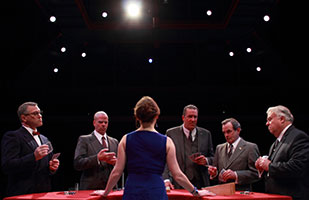Former Justice’s Play Offers Insights Into Former Presidents

Ex-presidents play high stake poker in former Supreme Court Justice Herb Brown’s latest play, The Final Table.

Ex-presidents play high stake poker in former Supreme Court Justice Herb Brown’s latest play, The Final Table.
He likes presidential history. He likes poker. So for former Ohio Supreme Court Justice Herb Brown one way to explore the hypothetical interaction between some of history’s most influential and controversial presidents is to put them together at the poker table where the stakes are high.
Former Justice Brown’s The Final Table is in its second week of performances by the CATCO Theatre in the Riffe Center in Columbus. Former Justice Brown was elected to the high court in 1986, but did not seek a second term after publishing his first novel in 1991. At age 61 at the time, he said he did not want to diminish his chances of a successful fiction writing career by investing his energy on the bench. Now at 83, he is receiving outstanding reviews for his second play.
The Final Table pits former presidents Harry Truman, Dwight Eisenhower, Richard Nixon, Lyndon Johnson and Warren Harding against each other in a game played in limbo. The winner has the chance to be reincarnated and come back as president, the loser goes to Hell.
Brown’s reasons for selecting those five presidents are based on research he conducted both as a writer and lawyer. His previous play, You’re My Boy was about the strained relationship of Eisenhower and his vice president Nixon. His interest in Johnson and Truman led to deep research about their careers, their relationships with Eisenhower and Nixon and all four presidents’ passion for poker.
Harding is positioned in the play to seem out of place with the other four power-hungry chief executives, and Brown told an audience after a recent performance of the play that there are several reasons for it. One is that he got to know the Harding family well representing them in his private legal practice as the family attempted to block a biographer from using the love letters Harding wrote to his mistress before becoming president. In a settlement, the Harding family donated the letters to the Library of Congress to keep under seal for 50 years, which finally allowed them to be revealed in 2014.
“Harding didn’t really seek out the presidency or power. I thought that was interesting,” Brown said. “And he really loved poker. He played almost every night.”
Another reason for using Harding as a character in the play was his ability to quote Bible scripture, and with the play set in the afterlife, Harding’s character helps drive the plot back to the metaphysical questions being put to the ex-presidents by the card game’s dealer, Clio. Clio, the Greek muse of history, tells the presidents she is authorized to send the winner back to be president if that person could rescue America and the game quickly becomes one of not just who has the best hand, but who also provides her the best answers on leadership and problem solving.
Brown said poker is the perfect forum because of its great equalizing quality, and that no matter if you are rich or poor everyone is playing by the same rules and with the same amount of luck at the poker table.
In limbo, the ex-presidents are able to see what is happening in the world today and pounce on opportunities to tell Clio why they are the most worthy to return and how they would tackle gridlock in Washington and other major issues. In the meantime, they each take wicked shots at each other’s record in office, settle personal scores and squabble about scandals. The play is full of adult language especially the gritty Johnson and the paranoid Nixon, as played by local actors Ralph Scott and Jon Putnam respectively.
Asked by the audience after the play why the two were so vulgar, Brown responded that much of what was said came straight from the transcripts of recordings and biographies of the two presidents.
The CATCO run was scheduled to end April 26 but has been extend to May 2. When asked if the play could change in the future, Brown said plays are always evolving and that could be expected of The Final Table in future performances.
Hear more from Brown about the play, and what audience goers have to say.


